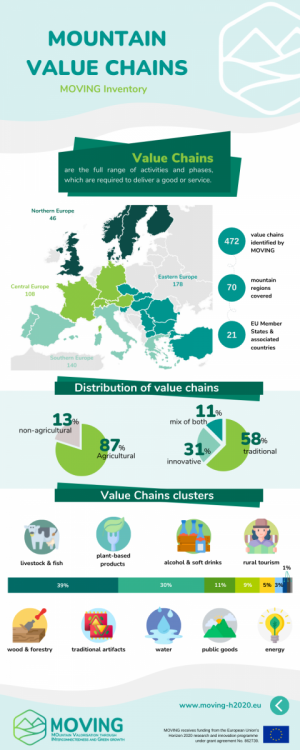Latest MOVING project news
- Final MOVING summary report now available.
- On 3rd July 2024 the James Hutton Institute held our final regional event with stakeholders who have been part of the MOVING Multi-actor Platform in Scotland. These included actors from the whisky industry, tourism sector and environment sectors. In the pleasant surroundings of the Glenlivet Distillery we discussed how different sectors can work together to ensure the social and environmental sustainability of the Speyside and Cairngorms region.
- From 1-3rd July, the James Hutton Institute, together with the Cairngorms National Park Authority, hosted seven Romanian visitors as part of a cross-case study visit to understand and learn about governance and working with communities in protected areas. The Romanian visitors represented UNESCO geo-parks, certified eco-tourism providers and two Romanian national/natural parks.
- On June 24th MOVING held its last Consortium meeting before the scheduled end of the project in August. The meeting was an opportunity to review the MOVING journey, highlighting both successes and challenges encountered along the way.
- On June 13th and 14th Kirsty Blackstock attended MOVING’s Final Policy Conference ‘A Future for Mountain Areas in Post-2027 EU Priorities” in Brussels, marking the culmination of a four-year journey for the project. This two-day high-level event gathered over 60 participants from European Institutions (European Parliament, European Commission, European Economic and a Social Committee, Joint Research Centre), EU support services (ESPON, Joint Research Centre, Rural Pact Support Office), EU stakeholder groups (Euromontana, AREPO), research community and local/regional mountain actors to underscore the crucial role of mountain areas in advancing Europe’s political objectives and targets by 2030.
- In June 2024, Kirsty Blackstock gave an invited presentation on the results and what they mean for Post 2027 EU policies, the meeting report and presentations can be found here.
- In March 2024, we joined our partners in Cordoba, Spain to have a final in person project meeting, where we shared common findings. We visited the Spanish Olive Oil and Iberico Ham mountain value chain producers, which was very inspiring and also shared their delicious products.
- The results were also used to help deliver a Scottish Government project on water scarcity projections including impacts on distilleries, with final reports available here.
- On January 11th 2024 Liz Dinnie joined over 50 high-level European experts on mountains in Brussels, Belgium, to discuss the future of mountain regions and enabling post-2027 EU policies for these regions. The discussion was part of the European Foresight Workshop for resilient mountain areas.
- In November 2023 Liz Dinnie and Chloe Thompson joined 100+ stakeholders from across our 23 mountain regions in Budapest, Hungary for a 3-day workshop focussed on ‘Unlocking the Power of Mountain Value Chains’ through facilitating dialogue between partners . Participants shared common challenges from their regions and identified recommendations for creating enabling environments in mountain areas with a strong focus on the resilience and sustainability of value chains.
- In November 2023, Kirsty Blackstock gave an invited presentation on the results and what they mean for the European Year of Skills agenda during the EUROMONTANA “Skills for Mountains in Transitions” conference in Brussels 21st November, for more information, see the final report and slides here. Our intervention was to stress the need for relational and governance skills as well as technical skills.
- Research to identify positive strategies that value actors can take to make their value-chain assemblages more resilient has been completed. Read the deliverable https://www.moving-h2020.eu/wp-content/uploads/2023/06/MOVING_D4.6_Upgrading-Strategies.pdf]
- Easy to read information on the different case studies can be found in the practice abstracts published in August 2023 https://www.moving-h2020.eu/library/
- Our latest summary of the Speyside case can be read here https://www.moving-h2020.eu/wp-content/uploads/2023/08/23-MOVING_PA_UK.pdf – summarising how Whisky, Food and Drink value chains can use technology, cooperation and youth to improve their resilience and interactions but these activities need funding.
- We are leading a cluster of comparative research on governance and cooperation to share good practice between cases. Information about this research can be found here https://www.moving-h2020.eu/wp-content/uploads/2023/04/MOVING_Clusters_v3.pdf. A multi-national stakeholder workshop is being held in November in Hungary to share knowledge and progress the research.
- Browse through all of the MOVING Digital Stories. The package of 23 short videos provides an overview of the vulnerability of mountain value chains in European and neighbourhood countries. Access here
- To view the storymap introducing the Speyside Whisky Value Chain case study access here. It contains a series of pages which introduce the region, as well as some of the key elements of the value chain assemblage. Further links to additional information, as well as some of the project deliverables, are available via the “Digital Objects” elements on each page. February 2023.
- Publication of the report: Vulnerability and Resilience of the Speyside Whisky, food and drink tourism value chain assemblage. December 2022. Read the report here.
- You can view the slides from some of our recent presentations here. One presentation exploring the role of young people in sustainable mountain development (Presented at ODT, October 2022) and one presentation on our value chain work presented at ESRS. June 2022.
- In May 2022, we presented our approach to value chain analysis to the sustainable land management working group of the Scottish Forum on Natural Capital. It was a sister presentation to work by the Scottish Agricultural Organisation Society on barley supply chains. In both cases, stakeholders were interested how the work could make natural resources more visible in the success of the Scottish Food and Drink sector. Meeting notes are here and presentation slides located here.
- Colleagues in Hutton and University of Aberdeen have recently produced this short video (2 min 18 sec) entitled ‘A Dam Fine Dram‘ to highlight how Nature Based Solutions are being used at Glenlivet Distillery to mitigate low water flows. May 2022.
- The Hutton team are responsible for leading the Extended Value Chain Analysis (EVCA) being conducted by partners in all of the case study areas across Europe. The following guidance and templates were completed for each value chain: EVCA template and Diagram template, which informed analysis (including qualitative content analysis using Nvivo and descriptive analysis using Excel) and reporting, lead by the Hutton team. The deliverable report is available here and on the main MOVING website.
- A report from our stakeholder workshops discussing the Speyside Malt Whisky value chain is available here.
- The value chain diagrams discussed in the May 2022 workshops are available here. Workshop participants were also given a chance to comment on these.
- Vulnerability of the Speyside whisky industry to environmental change. Two reports from this recent research (Autumn 2021) can be found here. A research report and a technical report.
- A selection of mountain value chain: private sector valorisation of natural capital?, Research Note, January 2022.
- A report highlighting policy briefs of each country’s value chains and its policy context is now available to view here.
- You can now view the report commencing the participatory value chain work across the whole project here.
For more information about MOVING, read the project leaflet, project press release or visit the project website and blog. You can also subscribe to the project newsletter and follow us on Twitter.




